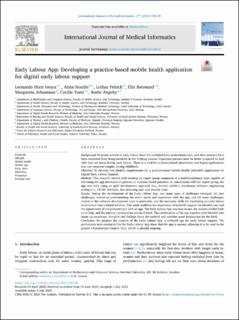| dc.contributor.author | Iwaya, Leonardo Horn | |
| dc.contributor.author | Nordin, Anna | |
| dc.contributor.author | Fritsch, Lothar | |
| dc.contributor.author | Børøsund, Elin | |
| dc.contributor.author | Johansson, Margareta | |
| dc.contributor.author | Varsi, Cecilie | |
| dc.contributor.author | Ängeby, Karin | |
| dc.date.accessioned | 2023-11-03T14:29:00Z | |
| dc.date.available | 2023-11-03T14:29:00Z | |
| dc.date.created | 2023-08-08T12:38:07Z | |
| dc.date.issued | 2023 | |
| dc.identifier.citation | Iwaya, L. H., Nordin, A., Fritsch, L., Børøsund, E., Johansson, M., Varsi, C. & Ängeby, K. (2023). Early Labour App: Developing a practice-based mobile health application for digital early labour support. International Journal of Medical Informatics, 177, Artikkel 105139. | en_US |
| dc.identifier.issn | 1386-5056 | |
| dc.identifier.uri | https://hdl.handle.net/11250/3100584 | |
| dc.description.abstract | Background: Pregnant women in early labour have felt excluded from professional care, and their partners have been restricted from being involved in the birthing process. Expectant parents must be better prepared to deal with fear and stress during early labour. There is a need for evidence-based information and digital applications that can empower couples during childbirth.
Objective: To develop and identify requirements for a practice-based mobile health (mHealth) application for Digital Early Labour Support.
Methods: This research started with creating an expert group composed of a multidisciplinary team capable of informing the app development process on evidence-based practices. In consultation with the expert group, the app was built using an agile development approach (i.e., Scrum) within a continuous software engineering setting (i.e., CI/CD, DevOps), also including user and security tests.
Results: During the development of the Early Labour App, two main types of challenges emerged: (1) user challenges, related to understanding the users’ needs and experience with the app, and (2) team challenges, related to the software development team in particular, and the necessary skills for translating an early labour intervention into a digital solution. This study reaffirms the importance of midwife support via blended care and the opportunity of complementing it with an app. The Early Labour App was easy to use, the women needed little to no help, and the partner’s preparation was facilitated. The combination of the app together with blended care opens up awareness, thoughts and feelings about the method and provides good preparation for the birth.
Conclusion: We propose the creation of the Early Labour App, a mHealth app for early labour support. The preliminary tests conducted for the Early Labour App show that the app is mature, allowing it to be used in the project’s Randomised Control Trial, which is already ongoing. | en_US |
| dc.language.iso | eng | en_US |
| dc.rights | Navngivelse 4.0 Internasjonal | * |
| dc.rights.uri | http://creativecommons.org/licenses/by/4.0/deed.no | * |
| dc.title | Early Labour App: Developing a practice-based mobile health application for digital early labour support | en_US |
| dc.type | Peer reviewed | en_US |
| dc.type | Journal article | en_US |
| dc.description.version | publishedVersion | en_US |
| dc.rights.holder | © 2023 The Authors. | en_US |
| dc.source.volume | 177 | en_US |
| dc.source.journal | International Journal of Medical Informatics | en_US |
| dc.identifier.doi | https://doi.org/10.1016/j.ijmedinf.2023.105139 | |
| dc.identifier.cristin | 2165586 | |
| dc.source.articlenumber | 105139 | en_US |
| cristin.ispublished | true | |
| cristin.fulltext | original | |
| cristin.qualitycode | 2 | |

